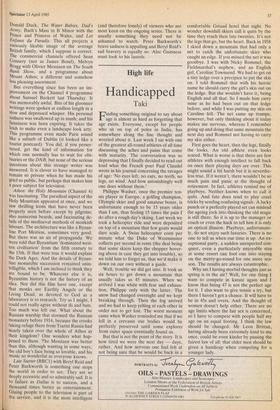Television
Ifs and buts
Peter Levi
My life has become so sedentary in recent weeks that my only exercise is adjusting lights and curtains for evening television, and letting the cat in and out. The cat quite likes television, particularly when it shows another cat, but I do not think she cares what the programme is so long as she has us pinned down. This she has in common with the programme plan- ners.
Sometimes programme planning for a week at a time is merely automatic. It is like a mad contractor who cannot stop until he has carpeted every room in the world from wall to wall. But one of the unsung qualities of the BBC is its admirable lack of ambition. On Good Friday they offered
Donald Duck, The Water Babies, Dad's Army, Bach's Mass in B Minor with the Prince and Princess of Wales, and Les Enfants du Paradis. This all projects a curiously likable image of the average British family, which I suppose is correct.
The commercial channels offered Sean Connery (not as James Bond), Melvyn
Bragg with Olivier Messiaen on The South Bank Show, and a programme about Mount Athos; a different and somehow less pleasing assortment.
But everything since has been an im- provement on the Channel 4 programme about Samuel Beckett last Thursday. It was memorably awful. Bits of his gloomier Writings were spoken at endless length in a Slow and depressed whisper. His personal sadness was swallowed up in mush; and his funniness was born expiring. It takes the Irish to make even a landscape look arty. This programme even made Paris sound like a suburb of Dublin (it looked like a tourist postcard). You did, if you perser- vered, get the kind of information for Which one normally has to wait for obi-
tuaries or the DNB, but none of the serious
questions about this strange writer was answered. It is clever to have managed to remain so private when he has made his grief so public, but perhaps that makes him a poor subject for television.
Athos: the Holy Mountain (Channel 4) was fascinating. The paradisal aspect of the
Holy Mountain appeared at once, and we saw thrilling icons that have never been Properly seen before except by pilgrims: also numerous beards, and fascinating de- tails of the mediaeval methods of monkish labours. The architecture was like a Byzan- tine Port Meirion, sometimes very good. But there was an air of propaganda. We were told that Byzantium 'dominated west- ern civilisation' from the fifth century to the 15th. If that were true it would explain the Dark Ages. And the details of Byzan- tine monarchic succession remained unin- telligible, which I am inclined to think, they are bound to be. Whatever else it is, Byzantine history is not the history of an idea. Nor did this film have one, except that monks are Earthly Angels or the Living Dead, as devoted to God as a laboratory is to research. Try as I might, I could not really agree without ifs and buts.
Too much was left out. What about the Russian warship that stormed the Russian monastery before 1914, because the crooks taking refuge there from Tsarist Russia had nearly taken over the whole of Athos as their kingdom? One wonders what hap- pened to them. The Messiaen was better than this, although wanting in some ways, the old boy's face being so lovable, and his music so wonderful as everyone knows.
Late Starter (BBC1) with Beryl Reid and Peter Barkworth is something one stops
the world in order to see. They are so
deeply eccentric and so admirably sad. It is to failure as Dallas is to success, and a
thousand times better as entertainment. Gluing people to the television is part of the service, and it is the most intelligent (and therefore lonely) of viewers who are most keen on the ongoing series. There is usually something they need not be ashamed to watch. Peter Barkworth's brave sadness is appalling and Beryl Reid's sad bravery is equally so. Alec Guinness must look to his laurels.















































 Previous page
Previous page